|
|
|
Sort Order |
|
|
|
Items / Page
|
|
|
|
|
|
|
| Srl | Item |
| 1 |
ID:
136121


|
|
|
|
|
| Summary/Abstract |
The events of this year have raised questions about fundamental concepts of international relations – War and Peace, the State, and International Law. These reflections evoke an especially philosophical mood in contrast to what is happening in world politics today, where all actors obviously lack a long-term vision and strategy.
|
|
|
|
|
|
|
|
|
|
|
|
|
|
|
|
| 2 |
ID:
136791
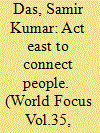

|
|
|
|
|
| Summary/Abstract |
As India marched into the new millennium with her renewed emphasis on what had come to be known as her 'Look East policy' being followed since the early 1990s, the Northeast appears to have been poised for a great leap forward. The region - being the key strategic node through which India can Look East farther towards the countries of Southeast Asia and eventually of East Asia - is no longer considered as 'a cul-de-sac leading nowhere', but as Verghese puts it, “a gateway to lands and opportunities beyond”.
|
|
|
|
|
|
|
|
|
|
|
|
|
|
|
|
| 3 |
ID:
136454
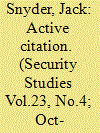

|
|
|
|
|
| Summary/Abstract |
Andrew Moravcsik makes a persuasive case that rigorously executed qualitative methods have a distinctive and indispensable role to play in research on international relations. Qualitative case studies facilitate the tracing of causal processes, provide insight into actors’ understanding of their own motives and assumptions, and establish an interpretive or systemic context that makes unified sense of discrete events. Teamed up with quantitative methods, qualitative methods can check on the presence of hypothesized causal mechanisms that might be difficult to measure in numerical shorthand.
|
|
|
|
|
|
|
|
|
|
|
|
|
|
|
|
| 4 |
ID:
134566


|
|
|
|
|
| Summary/Abstract |
This article argues that long-term changes in Turkish foreign policy are primarily due to the diversification of the country's political and economic interests. Important international structural shifts such as the end of the Cold War or the broad fluctuations in oil prices have constituted the initial impetus for the changes that we have seen in Turkish policies. Discussing alternative perspectives on new activism in Turkish foreign policy, the article gauges Turkey's foreign policy affinity (based on voting patterns in the United Nations General Assembly) and trade with other states to place recent trends in the broader context of the past three decades. It shows that, as the “West” has become less coherent in its policies, Turkey has moved closer to EU members and distanced itself from the US. The data also undermine “shift of axis” arguments as Turkey's foreign policy affinity with Middle Eastern countries has, in fact, declined. The trade data reveal a diversification of the country's commercial interests that contribute to Turkey's increasing regional activism. The country now balances its long term European interests with its recent regional ones.
|
|
|
|
|
|
|
|
|
|
|
|
|
|
|
|
| 5 |
ID:
134956


|
|
|
|
|
| Summary/Abstract |
In her position as a rising power, India has reassessed and reinvigorated the entirety of her relations with Africa in the past decade. These relations cover the economic, political and the security spheres. They are the result of India’s ideational foreign policy change, her economic growth trajectory, looming energy insecurity and India’s role as an increasingly important international stakeholder. The main argument of the article is that India has successfully worked out her own policies, institutional structures and inter-regional development schemes with unique characteristics to develop and deepen linkages with sub-Saharan Africa. The article concludes that India now has a potential of assuming the role of ‘game changer’ in the new scramble for Africa’s resources and the struggle for votes and support of African states in international institutions and fora.
|
|
|
|
|
|
|
|
|
|
|
|
|
|
|
|
| 6 |
ID:
135140


|
|
|
|
|
| Summary/Abstract |
Twenty years ago this month, North Korea and the United States concluded the Agreed Framework. That accord halted North Korea’s nuclear weapons program at Yongbyon in exchange for heavy fuel oil and the eventual provision of two light-water reactors (LWRs) at Kumho, North Korea.
The agreement was the result of prolonged negotiations during a tense period. Unfortunately, its success was temporary. Eventually it became clear that North Korea in the late 1990s was pursuing a clandestine program to enrich uranium for use in nuclear weapons in violation of the Agreed Framework. In October 2002, when an official U.S. delegation confronted the senior North Korean negotiator with this information during talks in Pyongyang, the negotiator admitted that North Korea was pursuing an enrichment program and other unspecified programs.
Subsequent to this admission, North Korean officials maintained that they did not have an enrichment program. They changed their story again in 2010, when they revealed to visiting U.S. nuclear expert Siegfried Hecker that they had an enrichment facility at Yongbyon with 2,000 spinning centrifuges. Hecker was permitted to visit this facility and was impressed with its sophistication.[1] Thus, the issue of North Korea’s clandestine enrichment program was finally put to rest. North Korea proudly admitted having the program, despite its past disclaimers and the skepticism of observers in the United States and China who questioned the U.S. intelligence community’s assessment that North Korea had a clandestine enrichment program for nuclear weapons development
|
|
|
|
|
|
|
|
|
|
|
|
|
|
|
|
| 7 |
ID:
136700


|
|
|
|
|
| Summary/Abstract |
Australia should not embrace America, writes its former prime minister, but preserve itself from Washington’s reckless overreach.
|
|
|
|
|
|
|
|
|
|
|
|
|
|
|
|
| 8 |
ID:
136540


|
|
|
|
|
| Summary/Abstract |
This article argues for a new way of addressing contemporary international law that is more adequate to both vital dynamic trends towards “regionalism” within international law, relations and politics, and the emergent possibility of a far more pluralistic “multipolar” legal order that—in both theory and practice—contrasts markedly with US-dominated hegemonic modes of regulation and high-handed unilateralism. To advance our argument, we draws upon classic Schmittian forms of Grossraum theory concerned to adapt traditional state-centric and purely horizontal conceptual types of international law interpretations to a form of international relations structured around regional ensembles, such as the European Union, NATO, the African Union, and the Shanghai Cooperation Organisation (SCO). These historical trends are emerging out of an encompassing contemporary developmental tendency, including the decline in the traditional nation state posited as having equal status, and both the proliferation of new regional bodies and the strengthening of existing ones. Arguably, the emergence of the SCO from 2001 signals a new phase in multilateralism in the post-Cold War period that, when treated as a case study, allows us to “test out” the credibility of key aspects of Grossraum theory.
|
|
|
|
|
|
|
|
|
|
|
|
|
|
|
|
| 9 |
ID:
136810


|
|
|
|
|
| Summary/Abstract |
India and Australia have overall traditionally shared cordial relations despite hitting rough weather during certain phases. With India’s efforts to look further east beyond her immediate south-eastern neighbors, and Australia’s desire to look further west beyond Japan and South Korea, have of late brought greater convergence in their interests.
|
|
|
|
|
|
|
|
|
|
|
|
|
|
|
|
| 10 |
ID:
135345


|
|
|
|
|
| Summary/Abstract |
It is widely recognised that the Anglo-American ‘special relationship’ fluctuated following the Second World War. A “Persistent rivalry” was especially evident in policy towards the Middle East and its oil. Immediately after the war, the American attitude to Palestine seemed to complicate British policy. Events in Iran also reflected the clash between the British imperative to protect its national and imperial interests in the region on the one hand, and the American preoccupation with the Cold War and containment on the other. The subsequent differences over Egypt/ Nasser are a matter of public record as are the problems which arose over the British withdrawal from “East of Suez”. Perhaps the very closeness of the relationship between the UK and the US served to heighten expectations.
|
|
|
|
|
|
|
|
|
|
|
|
|
|
|
|
| 11 |
ID:
136593


|
|
|
|
|
| Summary/Abstract |
During the summer of 2014, the U.S. government once again offered the State of Israel unwavering support for its aggression against the Palestinian people. Among the U.S. public, however, there was growing disenchantment with Israel. The information explosion on social media has provided the public globally with much greater access to the Palestinian narrative unfiltered by the Israeli lens. In the United States, this has translated into a growing political split on the question of Palestine between a more diverse and engaged younger population and an older generation reared on the long-standing tropes of Israel’s discourse. Drawing analogies between this paradigm shift and the turning point in the civil rights movement enshrined in Mississippi’s 1964 Freedom Summer, author and scholar Robin Kelley goes on to ask whether the outrage of the summer of 2014 can be galvanized to transform official U.S. policy.
|
|
|
|
|
|
|
|
|
|
|
|
|
|
|
|
| 12 |
ID:
134961


|
|
|
|
|
| Summary/Abstract |
This special issue of the Asia Europe Journal focuses on a triangulated conversation between scholars working in/on Asia, Europe and Australia. The essays showcase the work of early career researchers involved in the EU-Oceania Social Science Inter-regional Consortium (EUOSSIC) Erasmus Mundus exchange programme that links leading universities in Europe1 with those in Australia2 and New Zealand3 to promote the study of European Union (EU) external relationships. Erasmus Mundus was launched in 2004 and is funded by the Education and Culture Directorate General of the European Commission with the objectives of enhancing the quality of European higher education and the promotion of dialogue and understanding between people and cultures through cooperation with third countries. The aim of the EUOSSIC Erasmus Mundus exchange programme (2011–2013) is to build on existing connections to create a formal programme of inter-regional exchanges between the EU and Oceania for doctoral and post-doctoral scholars as well as academic staff with a Social Science background. In total, 61 doctoral students, 11 post-doctoral fellows and 27 academic staff were involved in the EUOSSIC Erasmus Mundus programme.
|
|
|
|
|
|
|
|
|
|
|
|
|
|
|
|
| 13 |
ID:
136185


|
|
|
|
|
| Summary/Abstract |
Over the past decade, formerly close U.S.-Saudi relations have been under immense political pressure, in private and increasingly in the public media, as the two governments have dealt with the consequences of the 9/11 attacks, the 2003 Iraq War and the Arab Spring. However, there are significant U.S. interests at stake in the Middle East that require Washington to maintain at least a working relationship with Riyadh:
|
|
|
|
|
|
|
|
|
|
|
|
|
|
|
|
| 14 |
ID:
134995


|
|
|
|
|
| Summary/Abstract |
Australia’s foreign and security policy debate has become focused on how to manage the fundamental change in strategic and economic circumstances brought about by China’s rise. For the first time in the
nation’s history, Australia’s chief trading partner is neither an ally, nor the ally of an ally, and does not share its democratic outlook and values. This change comes against the backdrop of an increasingly
contested Indo-Pacific Asia. This article addresses two questions. First, how does Australia perceive a rising and increasingly powerful China? Second, how is Australia responding? It is argued that Australia possesses a discernable China strategy, although questions remain about its implementation, effectiveness and sustainability. That strategy has two broad strands—engagement and hedging—and the hedging strand contains several important sub-strands, namely, internal balancing (modernizing Australia’s own military) and external balancing (especially strengthening the US alliance). Each of these hedging approaches carries its own problems and questions, particularly regarding Australia’s willingness to fund an advanced military and whether the net effect of a strengthened US alliance can be stabilizing.
|
|
|
|
|
|
|
|
|
|
|
|
|
|
|
|
| 15 |
ID:
134615
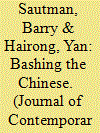

|
|
|
|
|
| Summary/Abstract |
The 2010 shooting of 13 miners at Zambia's small, privately-owned ‘Chinese’ Collum Coal Mine (CCM) has been represented by Western and Zambian politicians and media as exemplifying the ‘neo-colonial’ and ‘amoral’ practices of ‘China’ and ‘the Chinese’ in Africa. CCM has been used to provide a sharp contrast to the supposed ways of the Western firms that own most of Zambia's mines. Embedded in racial hierarchy and notions of strategic competition between the West and China, the discourse of the CCM shootings further shapes conceptions of global China and Chinese overseas. While examining all the oppressive conditions that have given rise to protest at the mine, we contextualize the shooting and subsequent conflicts. In analyzing CCM's marginal and troubled development, we discuss aspects of the 2010 shooting incident known to miners and union leaders, but ignored by politicians and media. We look at the shooting's political fallout, focus also on the epilogue that was the 2012 CCM riot—in which one Chinese person was murdered and several others seriously injured—and trace the sometimes violent discontent manifested at other foreign-owned mines in Zambia since their privatization in the late 1990s. The empirical data for this detailed study derive from hundreds of documentary sources and interviews with union leaders, workers, officials and others in Zambia from 2011 to 2013.
|
|
|
|
|
|
|
|
|
|
|
|
|
|
|
|
| 16 |
ID:
134846
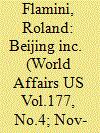

|
|
|
|
|
| Summary/Abstract |
This past Labor Day, a great many of the sausages consumed at cookouts across the country came from Smithfield Foods Inc., formerly the US food giant, but for the past year a wholly owned subsidiary of China’s Shuanghui International Holdings. Shuanghui paid $4.7 billion for Smithfield, whose operation spans hog farms and pork processing facilities in more than a dozen states, including Virginia, Maryland, North Carolina, and Wisconsin. The deal was China’s largest single investment in the United States to date, and helped boost Chinese mergers, acquisitions, and “greenfield projects” (companies setting up their own factories) to a record $14 billion by the end of 2013. Despite bilateral tensions over cyber espionage, Chinese territorial disputes with America’s allies in the South China Sea, and the slow progress of China’s massive economic reforms—and despite increasing calls for more scrutiny from Congress—China Inc closed a total of eight hundred and seventy-nine major deals last year across the American map, from New Jersey to California.
|
|
|
|
|
|
|
|
|
|
|
|
|
|
|
|
| 17 |
ID:
135537
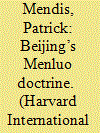

|
|
|
|
|
| Summary/Abstract |
Beijing has an incremental foreign policy in the South and East China Seas which appears to parallel America’s Monroe Doctrine. When the increasingly assertive young America declared that the Western Hemisphere was off-limits to the great colonial powers of Europe, President James Monroe’s eponymous doctrine altered the nature of trans-Atlantic relations. In retrospect, China is essentially following America’s footprints in trans-Pacifi c affairs with its own Ménluó (a transliteration of Monroe) Doctrine in the Asian Seas.
|
|
|
|
|
|
|
|
|
|
|
|
|
|
|
|
| 18 |
ID:
135303
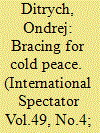

|
|
|
|
|
| Summary/Abstract |
The crisis in Ukraine has turned the tables of the post-Cold War relationship between the United States and Russia. The ongoing transformation can result in a number of outcomes, which can be conceived in terms of scenarios of normalisation, escalation and ‘cold peace’ – the latter two scenarios being much more probable than the first. NATO ought to shore up its defences in Central and Eastern Europe while Washington and its allies engage in a comprehensive political strategy of ‘new containment’. This means combining political and economic stabilisation of the transatlantic area with credible offers of benefits to partners in the East and pragmatic relations with Russia which are neither instrumentalised (as was the case with the ‘reset’) nor naïvely conceived as a ‘partnership’.
|
|
|
|
|
|
|
|
|
|
|
|
|
|
|
|
| 19 |
ID:
134845


|
|
|
|
|
| Summary/Abstract |
In the 1950s, when the communists came to power in both Vietnam and China, they warmly called each other “brothers,” affirming significant similarities of culture as well as ideological kinship. Over the years, however, attempts by Vietnam’s elder and stronger brother, China, to exert its authority have not always been accepted by its headstrong sibling. This filial defiance is rooted in a thousand years of Vietnamese resistance to attempts by Chinese feudal dynasties and their successor regimes to dominate it. Memories of that history and especially of the bloody nose the Vietnamese gave the People’s Liberation Army (PLA) in 1979, when it invaded to “teach Vietnam a lesson,” are central to understanding the relationship between the two countries today.
|
|
|
|
|
|
|
|
|
|
|
|
|
|
|
|
| 20 |
ID:
136714
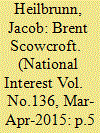

|
|
|
|
|
| Summary/Abstract |
Over the past five decades, beginning with his service to Richard Nixon and continuing to the present, Scowcroft has played a central role in promoting an internationalist foreign policy grounded in realist precepts.
|
|
|
|
|
|
|
|
|
|
|
|
|
|
|
|
|
|
|
|
|